
English_books / New Cambridge Advanced
.pdf
A dash (-) is used to add an afterthought - sometimes.
It was an excellent film - apart from the violence.
11 'Fargo' was a great film we all enjoyed it.
Q1 Rewrite this film review, adding the necessary punctuation: commas, apostrophes, quotation marks, etc.
A |
Nightmare |
on |
Elm Street |
made one experienced journalist |
|
scream |
|
||||
with terror |
at |
the |
preview |
screening I went to. The |
noise |
frightened |
|||||
me |
more |
than |
the film itself written and directed by Wes |
Craven |
an |
||||||
ex |
professor |
of |
humanities. Its all very spooky but |
not |
at |
all bloody |
|||||
says Wes of this teen orientated horror film which |
has |
a |
ghostly |
and |
|||||||
ghastly murderer attacking the children of Elm Street not |
in |
their |
|
||||||||
waking hours but in their dreams. John Saxon and Ronee |
Blakley |
dont |
|||||||||
believe all |
this |
and |
he a |
policeman goes looking for |
a |
real |
madman. |
||||
But we know better and so does Heather Langenkamp as their daughter. Langenkamp apparently known in America as the worlds most
promising |
Scream |
Queen |
screams |
louder |
than the journalist. I just |
cringed. |
||||
I think Craven has done better |
though one has to admit that its a |
|||||||||
good idea followed through with |
efficiency and |
state |
of |
the |
art |
special |
||||
effects. Perhaps my trouble was |
that I |
wanted |
the |
Evil |
One |
to |
win. I |
|||
cant stand |
those |
awful |
kids. |
|
|
|
|
|
|
|
2 The original review was in FOUR separate paragraphs. Decide where to insert the paragraph breaks.
Planning ahead . . .
Creative writing
Here are some guidelines on planning a piece of writing. Rearrange them in the sequence YOU prefer, leaving out any you consider to be irrelevant.
•Decide which points are irrelevant and should be left out.
•Decide which points are relevant and should be included.
•Write a first draft and check it through carefully, correcting any mistakes you notice.
•Check the facts and figures: can you spell all the names correctly?
•Think of your target reader: what does he or she want to find out from you?
•Write down your AIM: what is the main purpose of this piece
of writing?
•Write an outline in note form.
•Make notes of all the points you might want to make.
•Decide which points each paragraph will contain.
•Decide on your style and layout.
•Choose a title or heading, if necessary.
•Rearrange the ideas in the order you want to make them in your writing.
Planning what you're going to write may take a few minutes - but it usually saves time in the long run. If you organise your ideas well, your writing will be much easier for a reader to follow than if you just write the ideas down as they occur to you.
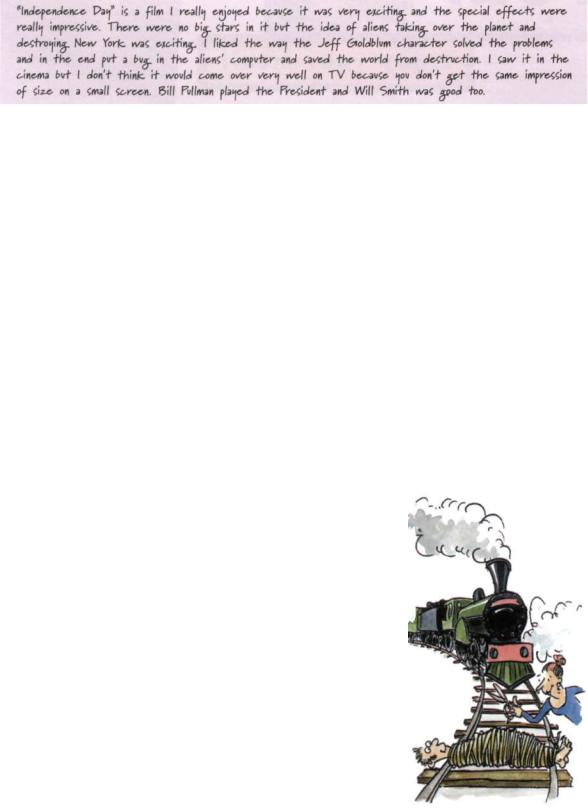
New Cambridge Advanced English
Look at this piece of writing and decide together what's wrong with it and how it can be improved:
Find out what shows or films both of you have seen and can remember reasonably well. Choose one that you share similar views on.
Make notes on the following aspects:
THE PLOT |
Give the reader an idea of the story. |
THE PEOPLE |
Tell the reader about the characters and the actors. |
DESCRIPTION |
Help the reader to imagine what it was like - what was particularly remarkable |
|
or memorable about it? |
YOUR REACTIONS |
Explain what you enjoyed and didn't enjoy. |
1Imagine you're writing in a student magazine or a local English-language newspaper. Write a review of a show or film, explaining why you recommend / don't recommend it to the readers (about 250 words).
2Show your completed review to another student and ask for comments.
At. . . and by . . .
Idioms
Replace the phrases in red with suitable expressions from the list below:
A T . . .
1 The hero was rescued a moment before it was too late.
2The show closed because it was running without making a profit,
3We were talking about different things but didn't realise it.
4It's impossible to get tickets for such a popular show without previous warning - you need to book no less than six months in advance.
5She was working much too hard causing harm to her health.
6 When abroad, it's advisable to carry your passport constantly.
7The winners are selected without any plan by a computer.
8It was a wonderful show - anyway I enjoyed it.
9It was a difficult problem and I was uncertain what to do.
to |
I'm sure that our friends will arrive very soon - anyway I hope so. |
11 |
If you need to stay overnight, please book a hotel room and we will pay. |
12I could tell by taking one quick look that there had been a mistake.
13Finally they did arrive, but by that time the show was nearly over.
BY. . .
14 'May I open the window?' 'Certainly!'
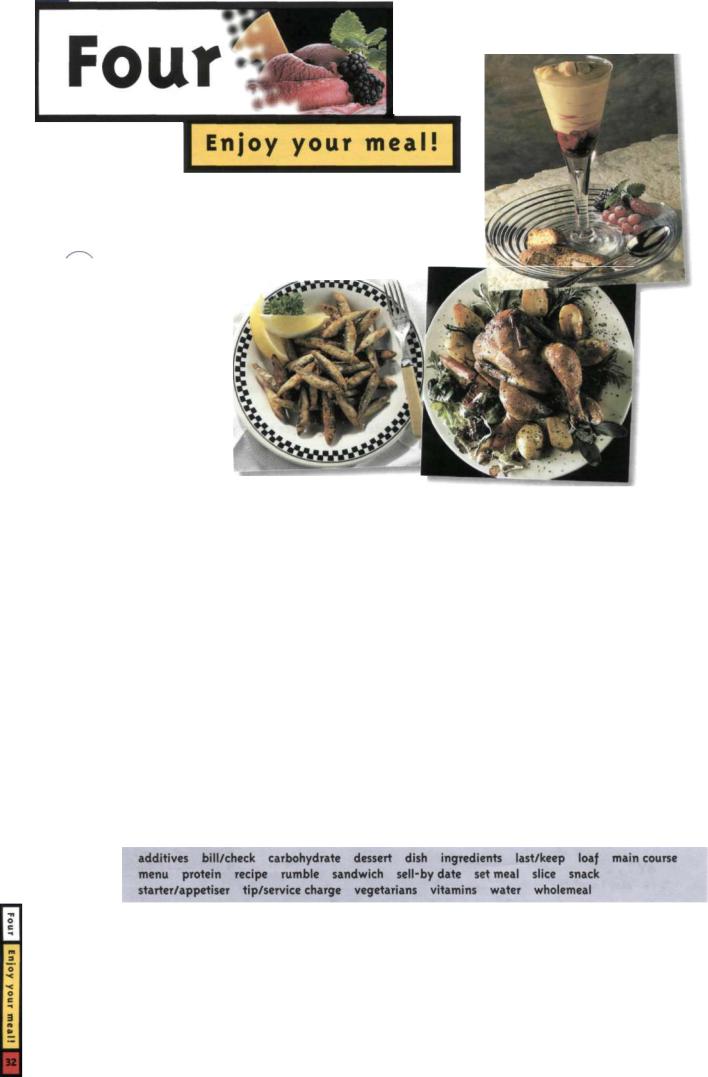
 4.1) To whet your appetite . . .
4.1) To whet your appetite . . .
Vocabulary
1Find out from your partners:
•which of the dishes in the photos they like most - and why
•what they ordered the last time they ate out - and what the other people at their table had
•what dishes they know how to cook
•what they'd cook if they were at home on their own and felt hungry
2Write down ten words that come into your mind when you think about food and drink.
B Fill the gaps in these paragraphs with suitable words from the list below.
1 |
If you buy something in a supermarket take a look at the label. The |
tells you how long |
|||
|
the product is supposed to |
. It also tells you if it contains any artificial |
|||
|
The nutritional information tells you how much fat, |
, |
and how many |
||
|
|
it contains. |
|
|
|
2 |
I'll give you my |
for pasta salad: it's a very easy |
to make if you have the |
||
|
right |
. There's no meat in it, so it's suitable for |
. You can have it as a |
||
|
|
for lunch or supper or as |
between meals if you feel peckish. |
||
3 |
In a restaurant it's usually better value to have the |
than to choose from the a la carte |
|||
|
|
. At the end of the meal, after you've had your |
, you ask for the |
||
|
|
. (in Britain you're expected to give an extra 10% as a |
.) |
||
|
Thinking about food makes my mouth |
and my tummy starts to |
|||
Find out from your partners:
•what they understand by the term 'good food' - and if it's importai
•if they 'eat to live' or 'live to eat'
•what kinds of food they consider to be 'healthy' and 'unhealthy'
•what convenience foods, takeaways and junk food they eat
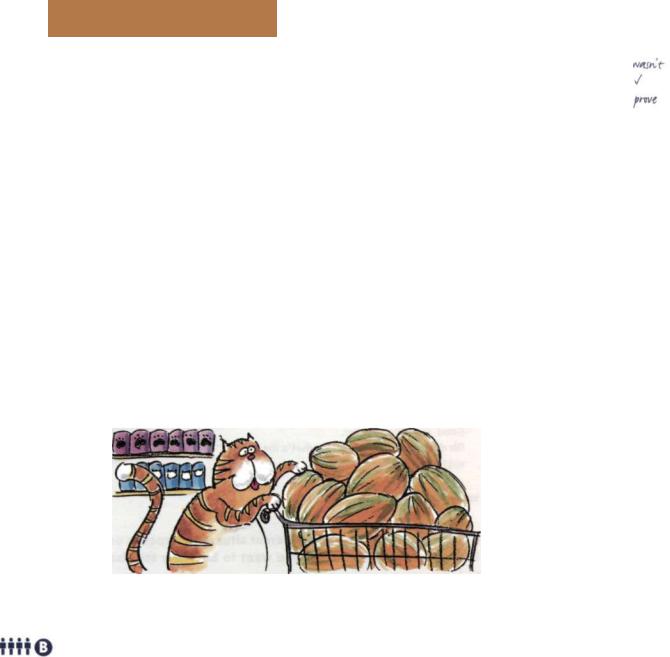
New Cambridge Advanced English
Favourite foods
Spelling and Punctuation
OIn most lines of this text there's either a spelling mistake or a punctuation error. Write the correctly spelled word or show the correct punctuation beside the line - or put a tick if the line is correct.
Cat cantaloupe
W |
1 |
e were eating cantaloupe and it was'nt very good. We should have let it ripen a little longer or |
|
maybe it never would have tasted good. Perhaps it was a cantaloupe doomed to fail from the very |
2 |
beginning but we will really never know because it didn't have a full chance to proof itself. |
3 |
When my wife and I finished, feeling vagely unsatisfied, we put our plates on the floor. I don't |
4 |
know why. We could just as easily have put them on the cofee table. |
5 |
We have a new borowed cat in the house. Because we don't spend the entire year here in Montana, |
6 |
we lure our neighbours cats over with extravagant promises of cat delicacies and all-expenses paid |
7 |
vacations to the Cat Ritz in Paris. We have a lot of mice. The cats never get to Paris. When we leave |
8 |
Montana for California, the cats go back to their original homes with unused passports. |
9 |
Anyway, the new cat walked over to the cantaloupe rinds on the floor and began very carfully |
10 |
examining one of them. The cat gave the cantaloupe an exploring lick. Then the cat: who would |
11 |
never get to use it's French, gave the rind a few more licks, but they were very much more familiar. |
12 |
The cat started eating the cantaloupe. I had never seen a cat eat cantaloupe before. I tried to |
13 |
imagane what the cantaloupe tasted like to the cat. I cannot think of anything that a cat would |
14 |
normally eat that would taste like a cantaloupe? |
15 |
We have to rule out mice, birds, gophers, insects, and eliminate such housecat foods as fish, |
16 |
chicken milk and all stuff that comes in cans, pouches and boxes. |
17 |
What is left that would taste like cantaloupe to a cat. |
18 |
I have not the slightest idee nor will I probably ever have but I know one thing for certain: I will |
19 |
never walk into a grocery store and go to the pet food section and see a can of cat cantaloupe on the shelf. |
20 |
from The Tokyo-Montana Express by Richard Brautigan
Find out from your partners:
•what their favourite meal of the day is - and why
•what their favourite meal of the week is - and why
•what their favourite vegetables, fruit, snacks and desserts are
•what their favourite national dish is - and how they'd explain it to a foreign visitor
Imagine that when Tim, an English friend, was staying with you in your home there was one particular dish that he very much enjoyed. Now he has written to ask you for the recipe. Send him the instructions for preparing the dish (about 200 words) and a short note
(about 50 words) to enclose with it.

Appropriate language
Speaking
1 Look at these short conversations and decide which remarks are NOT appropriate to the situations, as you imagine them. Decide what the people SHOULD have said.
|
Little boy: |
|
|
|
Hello. |
||||
|
Adult: |
|
|
|
Good afternoon, I wonder if I might have a word |
||||
|
|
|
|
|
|
with your mother? |
|||
|
|
|
|
|
|
|
|
|
|
|
|
|
|
|
|
OR |
|||
|
|
|
|
|
|
|
|
|
|
1 |
Shop assistant: |
|
Can I help you? |
|
|||||
|
Customer: |
|
No, that's not necessary. |
|
|||||
2 |
Guest: |
|
The meal wasn't as bad as I expected. |
|
|||||
|
Hostess: |
|
Oh, good. I'm so glad you enjoyed it. |
|
|||||
3 |
Your boss: |
|
Yes, come in. |
|
|||||
|
You: |
|
I'm going to come to work half an hour late |
|
|||||
|
|
|
|
|
|
tomorrow. |
|
||
k Boss: |
|
Do you see what I mean? |
|
||||||
|
New employee: |
|
Yes, and I don't agree with you. |
|
|||||
5 Friend: |
|
Would you excuse me, please? I'd very much |
|
||||||
|
|
|
|
|
|
like to make a phone call. |
|
||
|
You: |
|
Fine. |
|
|||||
6 |
Student: |
|
Have you had time to mark my composition? |
|
|||||
|
Teacher: |
|
Yes, and I do hope you don't mind my saying |
|
|||||
|
|
|
|
|
|
this, but you've made one or two tiny mistakes |
|
||
7 |
Waiter: |
|
Are you ready to order now? |
|
|||||
|
Customer: |
|
No, go away. |
|
|||||
8 Wife: |
|
|
Would you mind assisting me with the |
|
|||||
|
|||||||||
|
|
|
|
|
|
washing-up, if you've got a moment? |
|
||
|
Husband: |
|
|
Certainly, I'd be delighted to. |
|
||||
9 |
Waiter: |
|
|
Was your meal any good? |
|
||||
|
Customer: |
|
|
Yes, it was. |
|
||||
10 Patient: |
|
|
Good morning, doctor. |
|
|||||
|
Doctor: |
|
|
Oh dear, you look ghastly, what's the |
|
||||
|
|
|
|
|
|
matter with you? |
|
||
|
|
|
|
|
|
|
|
|
|
2 Compare your ideas with the model conversations.
B The kind of language you might use yourself in different situations depends on who you are talking to, and also how polite, tactful or direct you want to be. There are also different degrees of formality:
VERY FORMAL May I say what a pleasure it is to meet you.
|
I owe you a deep debt of gratitude. |
FORMAL |
It was a pleasure to meet you. |
|
Thank you very much indeed. |
NEUTRAL |
Goodbye. |
|
Thank you. |
INFORMAL |
Bye for now. |
|
Thanks a lot. |
FAMILIAR |
Bye-bye. |
|
See you. |
|
Cheers! |
Using a very formal phrase in an informal situation may sound pompous or sarcastic. Informal language in a formal situation may sound rude or disrespectful - or simply silly!

New Cambridge Advanced English
2Decide which of the following phrases are:
VERY FORMAL* FORMAL* NEUTRAL* INFORMAL or FAMILIAR
1A lot of people like fish and chips. Lots of people like curry.
A significant number of people prefer sandwiches.
2Good to see you.
It's a pleasure to make your acquaintance.
3I'd like to introduce myself. My name's...
May I introduce myself, I'm . ..
4Do you feel like a drink?
May I offer you a drink?
5Can I have tea, please?
I'd like a cup of tea, please.
6One should always try to be polite.
7Give my best wishes to your parents. Oh, love to Jim, by the way.
Please give my best regards to your wife.
Loads of people like fried chicken.
Many people enjoy hot dogs.
Hi there.
Pleased to meet you.
I'm .. . - what's your name?
My name's... - who are you?
Like a drink?
Would you like me to get you a drink?
Tea, please.
Would it be possible for me to have some tea?
you should always try to be polite.
Give my love to Mary, won't you?
Remember me to your husband.
Say hello to Sally from me.
1The vocabulary that we use may also change according to the SITUATION we are in. In most cases this is a question of:
•your ATTITUDE - serious, joking, sarcastic, disparaging, approving, etc.
•WHO you are talking to - someone older, younger, senior, friend, stranger, acquaintance, superior, male, female, etc.
•the SUBJECT you are talking about - food, farming, films, geography, etc.
2Decide what situations you would use these words or phrases in:
1 |
children |
kids |
youngsters |
boys and girls |
|
|
|
|||
2 |
people |
|
men and women |
ladies and gentlemen |
everyone persons |
population |
||||
|
human beings |
citizens |
|
|
|
|
|
|||
3 |
man |
boy gentleman |
bloke chap fellow person guy male |
|
||||||
4 |
woman |
lady |
girl |
person |
female |
|
|
|
||
5 |
food |
nutrition |
cuisine |
cooking feast meal |
banquet |
something to eat |
||||
6 |
delicious |
yummy |
nice |
tasty appetising quite nice |
wonderful |
superb |
||||
1If you're meeting someone for the first time, which of these topics would you talk about
-and which would you avoid?
sport politics your family business travel hobbies films the weather music books your education your job religion TV traffic public transport food
2Imagine that you're sitting with an English-speaking stranger on a train, which has stopped for no apparent reason in the middle of nowhere. The stranger is considerably older than you. Decide who's going to play the role of the stranger. Then begin a conversation and continue with small talk.
3This time you and an older stranger are sitting at adjacent tables in a cafe, where you've both been waiting a long time to be served. Begin a conversation and continue with small talk.
I wonder why we've stopped.
- Yes, so do I. Perhaps. . .
I wonder where the waitress has'got to.
- Yes, so do I. Perhaps .

Simple + progressive aspect
Grammar
f f O Discuss the difference in meaning between these sentences:
1When we got to the station the train had just left. When we got to the station the train was just leaving.
2He stood up when she entered the room.
He was standing up when she entered the room.
3He usually prepares the meal when his wife gets home. He is usually preparing the meal when his wife gets home. He has usually prepared the meal when his wife gets home.
A I've been reading your book.
5I'm not having dinner until 8 o'clock.
6They always ask questions in class.
7We'll be having breakfast at 7.30.
8Will you join us for lunch?
9I think you're being silly.
I've read your book.
I don't have dinner until 8 o'clock. They're always asking questions in
We'll have breakfast at 7.30. Will you be joining us for lunch? I think you're silly.
Look at these pairs of sentences, each of which illustrates how simple and progressive verb forms are used. Follow these steps for each numbered pair:
1First, look at the verbs in red and make sure you understand WHY that particular form is used.
2Fill the gaps in the sentence that follows.
3 Write a similar example of your own for each rule illustrated.
(Number 1 has already been done to show you what to do.)
Present simple or present progressive: does or is doing
Past simple or past progressive: did or was doing
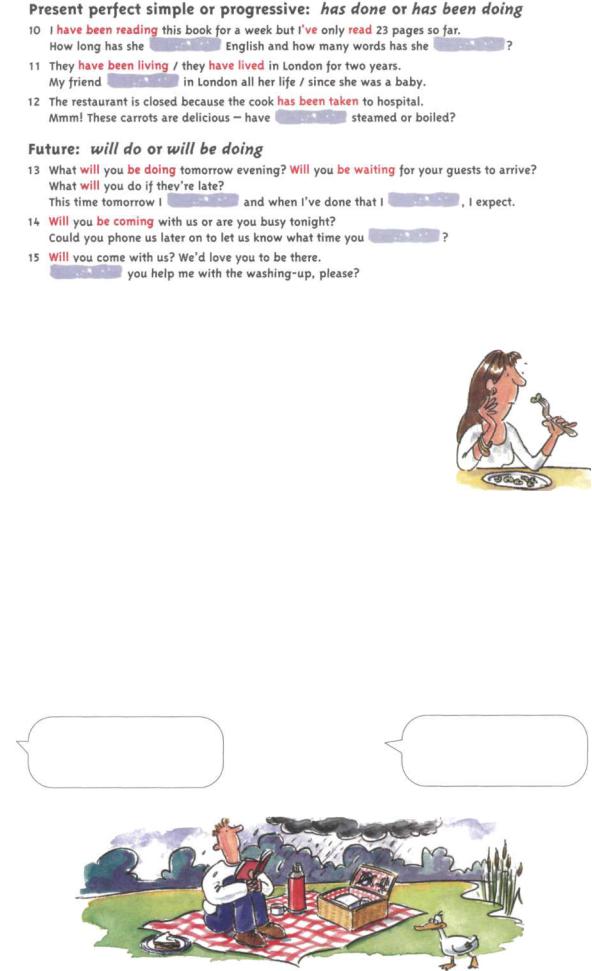
New Cambridge Advanced English
Find the errors in these sentences and correct them.
One sentence has NO errors.
f Weare usually having lunch out on Sundays.
2We can tafce a picnic but what will we be doing if it starts to rain?
3Shestaged at home because she was having a cold.
4While I drove along I suddenly remembered that I had left the freeier door open.
5The last time I saw him he was getting on a bus, eating an ice cream.
6f^reafcfast is normally being served in the dining room but toda^ it is served in the coffee shop.
7Who is this recipe boofc that's l^ing on the table belonging to?
8She was disliking vegetarian food at first but now she's enjoying it whenever she has been having it.
Find out about your partners' experiences of different kinds of food and drink, using the questions below.
• |
Unusual foods they have eaten - vegetables, fruit, fish, sauces, salads, sweets, cakes, etc. |
• |
Different cuisines - vegetarian, French, Italian, Chinese, Indian, Japanese, Creek, etc. |
• |
Strange things they have eaten - for breakfast, lunch, dinner, supper, elevenses, tea, etc. |
•Strange drinks they have drunk - hot/cold, alcoholic/soft
•Different kinds of meals - banquets, buffets, picnics, etc.
Have you ever. . . ? |
Do you ever. . . ? |
When did you first. . . ? |
How long have you . . . ? |
How many times have you . . . ? |
When do you . . . ? |
How often . . . ? |
What was it like exactly? |
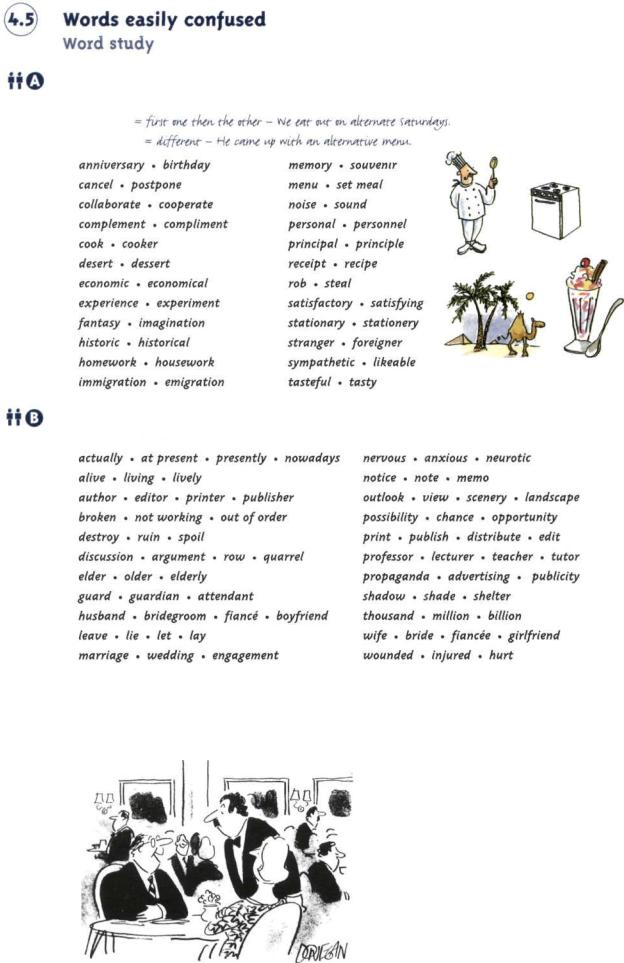
Take it in turns to explain the differences in meaning between each of these pairs of words. Write sentences to help you to remember any tricky ones.
alternate alternative
Explain the difference in meaning between the words in each of these groups. Check any unfamiliar words in a dictionary.
 1 Write down some more words which YOU personally often confuse - maybe words that are 'false friends' with similar words in your language.
1 Write down some more words which YOU personally often confuse - maybe words that are 'false friends' with similar words in your language.
2 Pass your list to another group and ask them to explain the differences in meaning.
'Yes, thank you-, everything's fine. Just to round off the evening, could we have something to eat and drink?"

|
|
|
|
|
|
New Cambridge Advanced English |
|
|
|
|
|
|
|
|
|
|
|
|
|
|
|
|
|
|
When a phrasal verb |
|
Bring, carry and take |
|
|
|
|
|
|||
|
|
|
|
|
has a literal (as |
|||
Verbs and idioms |
|
|
|
|
|
opposed to idiomatic) |
||
|
|
|
|
|
meaning, it's |
|||
|
|
|
|
|
|
|
||
Complete each sentence with a pronoun and a suitable particle from |
generally easy to |
|||||||
work out what it |
||||||||
the list below. |
|
|
|
|
means. |
|||
|
|
|
|
|
||||
1 |
I need my recipe book again, so could you bring |
it bac |
to me, please? |
|
|
|||
2 |
While your friends are here, bring |
to have a meal at my place. |
|
|
||||
3 |
There's a bottle of wine upstairs, could you please bring |
to me? |
|
|
||||
4 |
When our glasses were empty we took |
|
to the kitchen. |
|
|
|||
5I'm upstairs and I'd like some tea - could you bring to me, please?
6We don't need these plates any more, you can take
7 |
It's not a good idea to take |
if you don't know how to reassemble it. |
|
|
8 |
There's a box of empty bottles by the back door, could you carry |
, please? |
|
|
9 |
The dog picked up the bone and carried |
|
|
|
Rewrite the sentences, replacing the phrases in red with a suitable phrasal verb or idiom from the list below.
BRING
1 He was very upset: I wonder what caused that to happen? brougth (that) about
2She was cared for by her grandparents when her parents split up.
3Burger Prince have introduced a new product: it's called a Lamburger!
4After a long discussion I persuaded her to accept my point of view.
5Why don't you raise the matter for discussion at the meeting tomorrow?
6Her illness was caused by stress and overwork.
7Can we arrange our dinner for an earlier time?
CARRY
8Don't worry about me, just continue what you were doing as if I wasn't here.
9I was very excited when I saw the buffet and took more than I could eat.
10In the film the main character was having an affair with her brother-in-law.
11The canteen will be closed until repairs to the kitchen have been done.
TAKE
12There was so much information that we couldn't absorb it all.
13Looking after five children occupies all their time.
14This job carries a lot of responsibility - are you willing to undertake it?
15Considering his inexperience it's amazing they gave him the job.
16We assumed that you'd want to participate in the game.
17She did a brilliant impression of the boss's voice over the phone but we weren't deceived when she said we could all have a day's holiday.
18She gets very upset when people don't appreciate her.
19As I'd never tried skiing before, I didn't think I'd develop a liking for it.
20I'm sorry I was rude to you - I admit I was wrong in everything I said.
Most phrasal verbs have idiomatic meanings. If you don't happen to know what one means, you may have to use a dictionary.
bring about \/ |
bring forward |
bring on bring out bring round to |
bring up |
bring up |
|||
get carried away |
carry on with |
carry on with |
carry out |
take back |
take for granted |
take for |
|
granted take in |
take in take on take on |
take part |
take a day off |
take to |
take up |
take-off |
|
|
|
|
|
|
|
|
|
